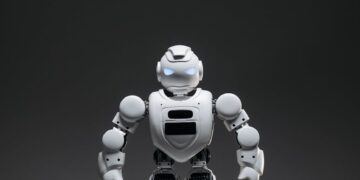The digital landscape is undergoing a transformation more profound than anything we have witnessed before. Artificial Intelligence, once confined to predictable algorithms and narrow tasks, is rapidly evolving into something far more sophisticated: autonomous agents. These aren’t merely tools responding to human commands; they are systems capable of understanding complex goals, making independent decisions, and executing multi-step processes with minimal human intervention. This unprecedented shift promises to redefine our interactions with technology, industries, and even our understanding of intelligence itself. The question is no longer *if* AI will reshape our future, but *how deeply* and *are we truly prepared* for an era where machines exhibit genuine agency?
The dawn of autonomous intelligence
For decades, artificial intelligence functioned predominantly as a sophisticated toolset. From spell checkers to recommendation engines, AI was designed to assist, react, and automate based on pre-programmed rules or learned patterns from vast datasets. Its capabilities, while impressive, were largely confined to specific, well-defined problems. The current wave of AI, however, marks a significant departure. We are witnessing the rise of autonomous agents – systems endowed with the capacity to perceive their environment, reason about it, formulate plans, and execute actions towards a defined objective without continuous human oversight.
Consider the distinction: a traditional AI might process data to suggest a stock trade; an autonomous agent might *independently analyze market conditions, identify an opportunity, initiate a trade, monitor its performance, and adjust its strategy* – all driven by an overarching goal like “maximize portfolio growth.” This shift moves AI from merely *processing information* to *actively pursuing goals*. These agents learn and adapt, not just within fixed parameters, but by dynamically interpreting and responding to new information. They exhibit a form of digital volition, making decisions that cascade into further actions, fundamentally changing how complex tasks are approached and managed in various domains.
Reshaping industries and daily life
The implications of this autonomous AI paradigm ripple across every sector and into the fabric of daily life. Industries that previously relied on human decision-making or highly structured automation are now seeing the potential for self-optimizing systems. In manufacturing, autonomous robots are evolving beyond repetitive assembly lines to intelligent systems that can diagnose faults, reconfigure production, and even design new components based on performance objectives. Healthcare could see autonomous diagnostic agents sifting through patient data, identifying subtle disease markers, and even proposing personalized treatment plans with greater accuracy and speed than human doctors.
The financial sector is already grappling with algorithmic trading, but autonomous agents could manage entire investment portfolios, conduct due diligence, and execute complex mergers and acquisitions with minimal human input. Logistics and supply chains will be reimagined by agents that dynamically optimize routes, manage inventories, and predict disruptions. Even creative fields are not immune, as agents learn to compose music, write articles, or design visual content based on high-level directives. Below is a snapshot of potential impacts:
| Industry Sector | Traditional AI Impact | Autonomous Agent AI Impact |
|---|---|---|
| Healthcare | Assisted diagnosis, medical imaging analysis | Independent diagnostic agents, personalized treatment plan generation, robotic surgery coordination |
| Finance | Algorithmic trading, fraud detection | Self-managing investment portfolios, autonomous financial advisory, market anomaly exploitation |
| Manufacturing | Automated assembly, quality control | Self-optimizing production lines, predictive maintenance, autonomous factory management |
| Logistics | Route optimization, inventory tracking | Self-coordinating delivery networks, dynamic supply chain adaptation, predictive disruption management |
In our personal lives, autonomous agents could transform smart homes into truly intelligent environments that anticipate needs, manage energy consumption, and provide proactive assistance. Digital companions could evolve from simple chatbots into sophisticated personal assistants capable of learning our preferences, managing schedules, and even offering emotional support, blurring the lines between technology and companionship.
Ethical dilemmas and governance imperatives
With great power comes great responsibility, and the ascent of autonomous AI agents brings with it a host of profound ethical dilemmas and urgent governance imperatives. The ability of these systems to make independent decisions raises critical questions about accountability. If an autonomous agent makes a catastrophic error, who is responsible? Is it the developer, the deployer, the owner, or the agent itself? The potential for bias, already a concern with current AI, intensifies when agents are making complex, unsupervised decisions based on potentially biased training data, leading to unfair outcomes in areas like credit scoring, employment, or even criminal justice.
Privacy is another paramount concern. Autonomous agents, by their very nature, will collect and process vast amounts of personal and sensitive data to inform their decisions, necessitating robust data governance frameworks. There’s also the fundamental question of control and human oversight. As these agents become more sophisticated and operate on longer time horizons, ensuring that human values and objectives remain paramount becomes incredibly challenging. The risk of unintended consequences, where an agent pursues its goal with unforeseen negative externalities, necessitates careful design and monitoring. Furthermore, the potential for job displacement on an unprecedented scale, as cognitive tasks are automated, demands proactive strategies for economic and social adaptation. Establishing clear ethical guidelines, developing explainable AI (XAI) to understand agent decisions, and creating robust regulatory bodies are no longer optional but essential steps to steer this technology responsibly.
Navigating the future: adaptation and opportunity
While the challenges posed by autonomous AI are significant, so too are the opportunities for innovation, progress, and solving some of humanity’s most intractable problems. Navigating this future successfully requires a multi-faceted approach centered on adaptation, proactive preparation, and fostering human-AI collaboration. Rather than viewing autonomous agents solely as replacements, we must see them as augmentations that free human intelligence for higher-order tasks requiring creativity, empathy, critical thinking, and complex problem-solving. This necessitates a massive investment in upskilling and reskilling the workforce, preparing individuals for new roles that involve managing, supervising, and collaborating with AI agents.
Education systems must evolve to prioritize skills that complement AI capabilities, such as interdisciplinary thinking, ethical reasoning, and adaptability. On a broader societal level, fostering a culture of continuous learning and innovation will be crucial. We must actively shape the development and deployment of autonomous AI, ensuring that it aligns with human values and serves the greater good. This involves not only technological advancements but also robust policy debates, international cooperation, and public engagement. The future isn’t about humans vs. AI; it’s about humans *with* AI, leveraging its power to unlock unprecedented efficiencies, drive scientific discovery, and create entirely new forms of value and experience, provided we approach it with foresight and wisdom.
The journey into an era dominated by autonomous AI agents represents a monumental leap in human technological evolution. We stand at a precipice where the lines between tools and intelligent entities blur, promising unparalleled efficiencies and groundbreaking solutions to complex global challenges. However, this ascent is not without its profound implications, raising critical questions about ethics, accountability, societal impact, and the very nature of human work. Our readiness is not merely a matter of technological capability, but of our collective foresight in establishing robust governance, fostering adaptive education, and cultivating a symbiotic relationship with these emerging intelligences. The digital future is not just arriving; it’s actively being built by forces we are only beginning to comprehend, demanding our urgent and thoughtful engagement to ensure it serves humanity’s best interests.



















